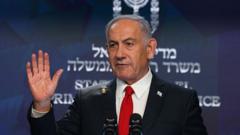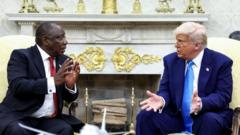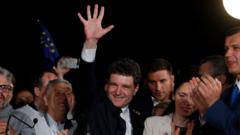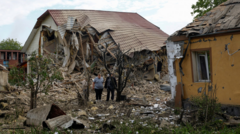Following the impeachment of Yoon Suk Yeol, South Korea faces significant political polarization, amplified by right-wing YouTubers and fervent pro-Yoon supporters. As the country grapples with the consequences, voices advocating extreme viewpoints have emerged on both sides, complicating the political landscape and fueling discord.
South Korea's Political Polarization Deepens as Yoon Suk Yeol's Tenure Ends

South Korea's Political Polarization Deepens as Yoon Suk Yeol's Tenure Ends
The impeachment of former President Yoon Suk Yeol intensifies divisions in South Korea, reflecting complex narratives fueled by social media and a polarized political landscape.
As South Korea's former President Yoon Suk Yeol steps down amidst a political storm, the nation he leaves behind is marked by deep divisions. The confirmation of his impeachment by the Constitutional Court has only heightened tensions, echoing resounding sentiments of loyalty among his supporters. Many assert that Yoon has become a martyr amidst accusations of election fraud and judicial bias, sentiments echoed fervently on social media platforms, particularly YouTube.
Yoon's political journey took a drastic turn when his controversial martial law declaration last December eroded much of the public's confidence in his leadership. Despite this, a fringe but vocal movement supporting him has gained momentum, fueled by influential right-wing YouTubers. These supporters often claim that the martial law was a necessary protective measure against opposition lawmakers and that the current conservative party has been victimized by a fraudulent electoral system.
The imagery drawn from placards at pro-Yoon rallies, particularly those invoking the "Stop the Steal" slogan popularized by U.S. politics, illustrates the extent to which international narratives have infiltrated local discourse. Yoon’s supporters have not shied away from violence; incidents such as storming courthouses during protests reveal a troubling trend toward extremism within these factions.
The political discourse surrounding Yoon has fragmented conservatives, with even traditional platforms expressing discomfort with this new wave of activism. Online narratives often juxtapose the Democratic Party to anti-North sentiments and accuse it of being aligned with foreign influence. With numerous public figures fostering distrust in established media, a distinct parallel has emerged between international conspiratorial thinking and domestic political challenges.
Supporters assert the election process was manipulated, voicing concerns over allegedly uncounted votes despite judicial rulings to the contrary. An emerging demographic among these supporters consists of young men galvanized by right-wing ideologies promoted through channels that share politically charged analyses.
As a response to the fallout from Yoon's impeachment, public sentiment towards the ruling People Power Party (PPP) remains paradoxical. Although approval ratings for the party decreased in response to his martial law, a resurgence in popularity has been observed as supporters rallied to defend Yoon, viewing him as a figure wronged by the establishment and the opposition.
The dynamics within the PPP reflect a growing chasm where some members vehemently oppose Yoon while others rally behind him. This fracturing could threaten the party’s cohesion as extreme elements continue to gain traction, worrying moderates and creating a push against compromise.
The repercussions of Yoon’s presidency, marked by a rise in polarized rhetoric on the right and a mobilization of counter-movements on the left, indicate a concerning trajectory for South Korea's political climate. Experts warn that ongoing polarization driven by the recent insurrectionist undertones may affect broader societal stability, signaling a pivotal, albeit troubling chapter in the country’s democratic evolution.


















